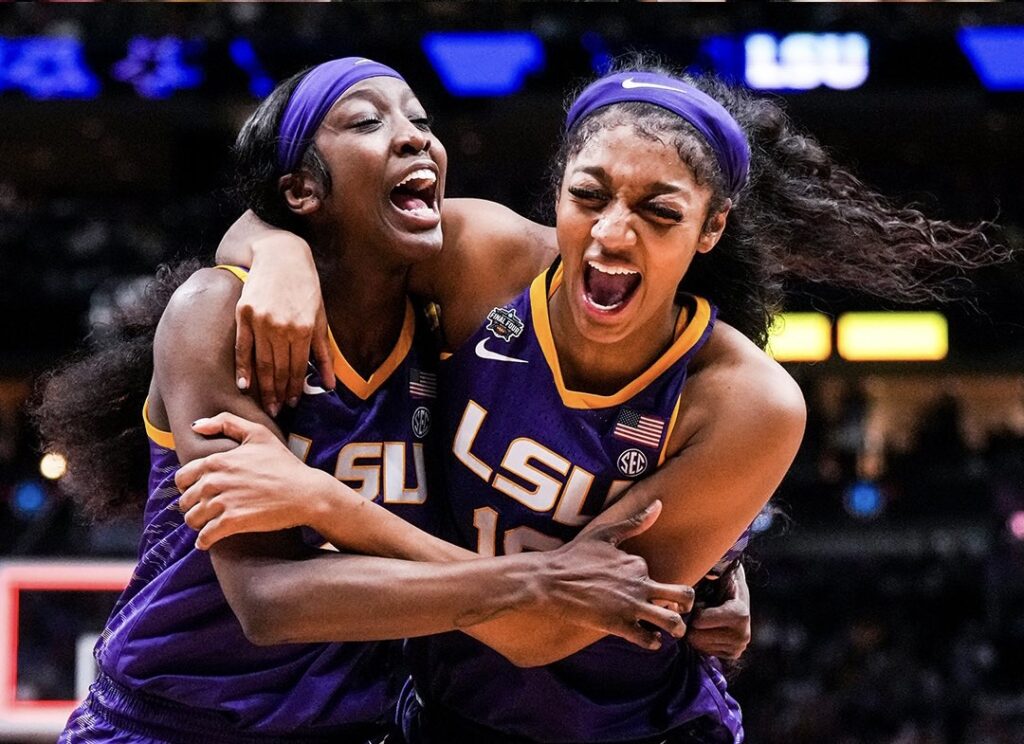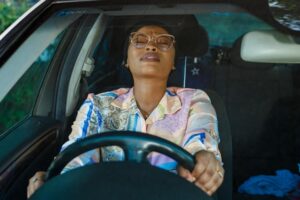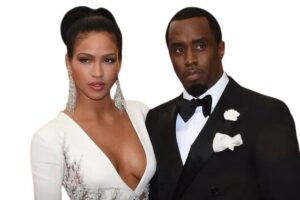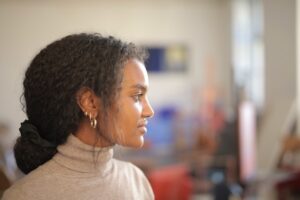Photo from Front Office Sports.
“When we speak we are afraid our words will not be heard or welcomed. But when we are silent, we are still afraid,” ~ Audre Lorde
On Sunday, April 2nd, the LSU Women’s Basketball team won the NCAA National Championship against Iowa. Down in the bayou, we cheered and celebrated as our state university’s women’s basketball team won their first national championship. But seconds after their historical win, liberals took to social media and began to insult and disrespect the players from LSU, which is a majority Black team. From negative comments to full on hate speech, I watched in disbelief as salty white men and women, along with token Blacks berated these ladies because, “Ain’t no damn way those ghetto girls should have beaten our queen, Caitlin Clark.”
As the attacks against their character gained momentum, especially against Angel Reese, Black women across the country cringed as we took their public disrespect personally. In addition to each of us having an intimate relationship with selective outrage and character assassination, we have also seen this level of blatant, public disrespect when former LSU track star, Sha’Carri Richardson was suspended from Team USA, and most recently when actress Angela Bassett reacted to Jamie Lee Curtis winning an Oscar over her. Oh, and we can’t forget how these same internet ‘critics’ dragged Ciara for wearing a see-through dress to the Vanity Fair Oscar afterparty were she wasn’t the only woman nakedly dressed. Collectively, we felt and understood all of these women.
Reese, still running high from her win, didn’t back down as she took to Twitter and clapped back:
“I’m too hood”, I’m too ghetto. I don’t fit the narrative and I’M OK WITH THAT. I’m from Baltimore where you hoop outside & talk trash. If it was a boy y’all wouldn’t be saying nun at all. Let’s normalize women showing passion for the game instead of it being ‘embarrassing.’”
Instead of that being the end and everyone going on about their lives and letting the new NCAA Champions enjoy their victory, along comes First Lady Jill Biden announcing that she was inviting Caitlin Clark and Iowa to the White House along with victorious LSU to applaud the historic game and all women athletes. Wait…what?!
Now I know that Jill knows this game is played every year and that only one team wins, and all of the teams that make it to the tournament have to play exceptionally well. And yes, I agree that women’s basketball is underrated – just look at the salaries WNBA players make compared to NBA ballers. But it’s a sport, and like in every other game, there can only be one winner. Everyone can’t be number one.
Then came the double standards from the armchair commentators. ‘Nice white’ women tried to explain to real sports fans that Angel and the LSU players were rude and didn’t have any manners, while blatantly dismissing Clark’s behavior when she told a player from an opposing team to shut up and taunted others on the court during the NCAA tournament too. They also tried justifying the first lady’s invitation to the White House to both teams as the right thing to do. Meanwhile, white men and a few Blacks too, tried to tell Black Twitter that these ladies should have acted like they had been there before and accepted their win with grace (which no one could define grace when I asked them too). Black women knew that this was a bunch of B.S. because we have been here before – with society policing what we say and telling us how we should behave. We knew this selective outrage had nothing to do with how the players reacted leading up to the championship nor when they won, but more to do with racism and society trying to put a Black woman back in her place. So we rose up in numbers and went hard for these Black queens.
Experts like Brene Brown encourage us to be ‘vulnerable’ and lean into difficult situations, but the lived experiences and societal traumas of Black women differ from those of whites, which makes it difficult for us to embrace this ideology, which I talk about more in The Dangers of Courage Culture. But when Black women like Angel Reese and the LSU Women’s Basketball team attempt to show any type of emotions – even if it includes trash talking during a national championship, we are villainized and the consequences we suffer sometime includes vicious, hateful attacks on our character. When people could no longer attack Reese’s skills on the court, they went after her GPA, stating she was actually ineligible and shouldn’t have played in the championship game based on some award she didn’t win (by the way…no one could show proof of this).
In Daring Greatly, Brown starts by asking the reader to consider the following four questions:
- What drives our fear of being vulnerable?
- How are we protecting ourselves from vulnerability?
- What price are we paying when we shut down and disengage?
- How do we own and engage with vulnerability so we can start transforming the way we live, love, parent, and lead?
Before a person of any race can begin to embrace vulnerability and break their silence, two elements are needed: trust and safety. These elements are achieved when belonging, a core human need has been established within the environment. When humans have a sense of trust and safety we feel free to present our authentic selves; opening up and sharing who we truly are with those around us. As we can see from the events that have unfolded since Sunday’s win, Black women, no matter how much we accomplish, how hard we play, nor how many trophies we win, we will never be accepted by America because there is no sense of belonging between ourselves and whites. We don’t feel safe because of how we are treated. And trust…honestly, how can we trust anyone when every time we try to show up as our authentic selves we are ridiculed and judged.
To understand vulnerability one has to fully grasp the concept of psychological safety, a phrase coined by Amy Edmondson of Harvard University. Edmondson shares that psychological safety occurs when there is an absence of interpersonal fear and individuals can show up as their authentic self. “It is a belief that one will not be punished or humiliated for speaking up with ideas, questions, concerns, or mistakes,” (Helbig and Norman, 2023). Returning to the first three questions that Brown asks in Daring Greatly, there are a lot of factors that drive the fears of a Black woman and the price that we pay when we attempt to be vulnerable is usually treacherous.
In addition to us not feeling seen and heard because of a lack of representation in many settings and the misinterpretation of our emotions when we do attempt to engage in self-expression within society, we are also hyper aware of our environments, which stems from intergenerational and societal traumas that we battle daily, making it less likely for us to engage in vulnerability. While other times, we simply do not have the mental capacity to mask and pretend to safely navigate it all.
What drives our fear of being vulnerable? When Black women show vulnerability there are consequences such as being labeled angry, aggressive, mean, difficult to work with, or unable to handle our role, such was the case with Reese. What many in mainstream society fail to understand is that Black women have always functioned from a position of vulnerability vs one of privilege as our white counterparts. Hence the concept of us showing vulnerability, especially as leaders in the sports industry, tends to be a slippery slope that many are unwilling to navigate due to the imminent threat of misinterpretation. Brown asks how we are protecting ourselves from vulnerability? The answer – we chose silence.
Yet, even in our silence, we are still afraid – afraid of the labels or worse – losing our jobs, not being promoted, being demoted, losing respect, internally forgetting our dignity and self worth, which leads to anxiety, depression, heart problems, a stroke, diabetes, or death. This is the price that we pay when we shut down and disengage. Black women are also reluctant to engage in behaviors that could negatively influence how others perceive our competence, awareness, and positivity (Rozovsky, 2015). In the end, fear and lack of trust, intertwined with the dynamics of the work that we do, creates invisible barriers where they should not have to exist.
After carefully examining the work of Brene Brown from the lens of a researcher, I discovered a significant gap in her work – race. Although her research is marketed to everyone, it is limited when examining the lived experiences of minority women, which is reflective in the demographics of her participants. As I mentioned earlier, the life challenges that minority women encounter, differs from those of many white men and women when it comes to vulnerability and that is relevant and can not be dismissed.
Now I know someone out there reading these is going to try and tell me that I am wrong and that Brown does look at race – as she does, but her participant pool is very small when it comes to women of color, which means her research is heavily influenced by the views and lived experiences of whites. Don’t believe me…take a look.
According to Brown’s website, out of 750 female research participants that she and the graduate students at the University of Houston’s Department of Social Work interviewed for her research, only 30% of the women were Black – that’s 225 women, 135 were Latina and only 68 identified as Asian-American. Brown also shares on her website that she analyzed field notes she had taken from her meetings with graduate students who conducted participant interviews and assisted with the literature analysis, in addition to the experiences of approximately 400 master and doctoral social-worker students through her graduate course on shame, vulnerability, and empathy. According to the schools website, in the fall of 2022 the total enrollment for the university was 24,341 with 3,051 identifying as African American women, which represented 12.5% of the total university’s enrollment. Once that number is broken down into majors, it decreases and the lack of representation of minority women becomes even smaller. Brown also added that she analyzed field notes from the trainings she conducted with over 14,000 mental health professionals. When we look at the cost of a training with Brene Brown, the pay gap that exists between whites and Blacks and disposable income, in addition to the small percentage of Black mental health practitioners, you quickly realize minorities made up a small percentage of her sample – the people whom her written work is based on.
There was also no indication of socio-economic backgrounds, professional status, or geographical information, yet all of these things matter when taking a deep dive into a subject that examines psychological safety or the lack there of and what triggers how one engages when it comes to vulnerability.
According to Sargeant (2012) “subject selection in qualitative research is purposeful; participants are selected who can best inform the research questions and enhance understanding of the phenomenon under study. Hence, one of the most important tasks in the study design phase is to identify appropriate participants. The next factor that should be considered when it comes to qualitative research participants is the sample size. “In qualitative research the sample size is not generally predetermined. The number of participants depends upon the number required to fully inform all important elements of the phenomenon being studied.”
Unfortunately, although Brown did not factor race into her study, race is an ever present part of our lived experiences and can not be ignored. I also believe that if race was truly accounted for in her study, new concepts of vulnerability would have been presented. Although her sample size wasn’t predetermined, the participants that were purposefully selected did influence what she was hoping to better understand – except it was from the view point of a privileged white person living in America. If your participant pool is limited in the number of minorities that are included, it is damn near impossible to understand how they experienced a phenomenon and any recommendations that you give are purely an educated guess.
We all want to feel that we belong and have the ability to be vulnerable, especially after leaving the basketball court and achieving a historical win, while showing our emotions after a major set back or loss, or even in how we choose to dress. Yet America has shown us over and over again it refuses to create safe spaces for Black women where we are not judged, hence prohibiting us to be vulnerable and limiting our ability to show up authentically.
Until we are equally included in the research and our lived experiences examined on the same levels as everyone else- until we are treated just and fair in this country, Black women will continue to be “the most disrespected person in America, the most unprotected person in America and the most neglected person in America.” ~ Malcolm X
If you found this article informative, buy Dr. Yazeed a cup of coffee.
WATCH MY KEYNOTE ON BLACK WOMEN, EQUITY AND VULNERABILITY IN THE WORKPLACE
Dr. Carey Yazeed is a behavioral scientist who specializes in psychological safety in the workplace. She is the author of Shut’em Down: Black Women, Racism, and Corporate America, Everyday Struggle: How Toxic Workplaces Impact Black Women (both were bestsellers on Amazon in the category of business conflict), and Unbreak My Soul: How Black Women Can Begin To Heal From Workplace Trauma. Dr. Yazeed is currently available for speaking engagements and to facilitate professional development trainings. Click here to learn more.







